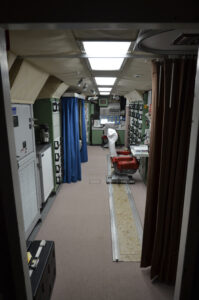The Minuteman Missile National Historic Site stands as a stark reminder of the Cold War era, encapsulating a period when the threat of nuclear war between the United States and the Soviet Union was a pervasive reality. This historic site offers a glimpse into the history of the Minuteman intercontinental ballistic missile (ICBM) program, which played a crucial role in the United States’ nuclear deterrence strategy. It not only preserves the physical remnants of this period but also serves as an educational resource, shedding light on the geopolitical tensions that defined the mid-20th century.
Key Takeaways
- The Minuteman Missile National Historic Site symbolizes the intense period of the Cold War, highlighting the strategic role of the Minuteman ICBMs in the United States’ defense plans.
- The site has transitioned from an operational missile silo to a historical landmark, offering visitors a unique perspective on the nuclear strategies such as Massive Retaliation and Mutual Assured Destruction that shaped global politics.
- Through educational outreach and visitor experiences, the site serves as a platform for understanding the Cold War legacy and the delicate balance of power that prevented nuclear conflict during that era.
The Crucible of the Cold War
The Cold War era was marked by a series of intense and dangerous standoffs between the United States and the Soviet Union, each armed with a formidable nuclear arsenal. This period saw the development and deployment of intercontinental ballistic missiles (ICBMs), including the Minuteman missile, which became a symbol of American military might and a cornerstone of its strategic deterrence policy.
The Birth of the Minuteman Missile
 The Minuteman missile emerged as a response to the growing need for a reliable second-strike capability. Its creation was driven by the desire to maintain a balance of power and to ensure that the United States could retaliate in the event of a Soviet first strike. The Minuteman’s solid-fuel design and rapid launch capabilities represented a significant technological advancement over earlier liquid-fueled ICBMs.
The Minuteman missile emerged as a response to the growing need for a reliable second-strike capability. Its creation was driven by the desire to maintain a balance of power and to ensure that the United States could retaliate in the event of a Soviet first strike. The Minuteman’s solid-fuel design and rapid launch capabilities represented a significant technological advancement over earlier liquid-fueled ICBMs.
Tensions Rise: Berlin and the Cuban Missile Crisis
The geopolitical tensions of the Cold War reached a fever pitch during events such as the Berlin Crisis and the Cuban Missile Crisis. The Cuban Missile Crisis, in particular, brought the world to the brink of nuclear war. The discovery of Soviet missiles in Cuba led to a tense 13-day standoff, which ultimately ended with a Soviet withdrawal and a secret agreement by the United States to remove its missiles from Turkey.
The Strategy of Deterrence: From Massive Retaliation to Mutual Assured Destruction
The United States’ nuclear strategy evolved from a policy of massive retaliation to one of mutual assured destruction (MAD). This shift reflected a change in thinking about nuclear warfare, recognizing that the only way to prevent it was to ensure that any nuclear attack would lead to the total annihilation of both the attacker and the defender. The doctrine of MAD played a crucial role in maintaining a precarious peace during the Cold War.
Preserving History: The Minuteman Missile National Historic Site
From Operational Silos to Historical Landmarks
The transition of Minuteman missile silos from instruments of war to historical sites is a testament to the changing times. Once the bedrock of American nuclear deterrence, these facilities now serve as poignant reminders of the Cold War era. The decommissioning process involved extensive environmental and structural assessments, ensuring that the sites met all safety standards for public access. Today, visitors can explore these relics of a bygone era, which stand as a symbol of peace and the resolution of global tensions.
The Visitor Experience: Echoes of the Atomic Age
Discover South Dakota’s attractions, parks, regions, and history at the Minuteman Missile National Historic Site. The visitor experience is immersive, offering a glimpse into the lives of the servicemen and women who operated these silos. Interactive exhibits, guided tours, and preserved launch control facilities provide a comprehensive understanding of the site’s strategic importance during the Cold War. The echoes of the atomic age resonate throughout the site, offering a unique educational opportunity for all ages.
Educational Outreach and the Legacy of the Cold War
The Minuteman Missile National Historic Site is not just a tourist destination; it’s an educational hub that connects the past to the present. Through various outreach programs, the site educates the public about the Cold War, nuclear deterrence, and the delicate balance of power that defined the era. The legacy of the Cold War is preserved through these efforts, ensuring that future generations understand the historical significance of the Minuteman missile system and the period of geopolitical tension it represents.
Frequently Asked Questions
What was the role of the Minuteman Missile during the Cold War?
The Minuteman Missile played a crucial role as a part of America’s nuclear deterrent strategy. It was a key component of the Single Integrated Operational Plan (SIOP) aimed at deterring Soviet aggression through the threat of massive retaliation, ultimately evolving into a policy of Mutual Assured Destruction (MAD).
How did the Cuban Missile Crisis influence the Minuteman Missile program?
The Cuban Missile Crisis highlighted the need for a reliable and quick-response nuclear arsenal. The Minuteman Missile, with its rapid launch capabilities, became increasingly significant as a means to provide a credible deterrent against the Soviet Union, ensuring a balance of power during tense moments like the crisis.
What can visitors expect to see at the Minuteman Missile National Historic Site?
Visitors to the Minuteman Missile National Historic Site can explore decommissioned missile silos and control facilities, experience educational exhibits about the Cold War and nuclear strategy, and gain insights into the historical context that led to the creation of such a formidable nuclear arsenal.






